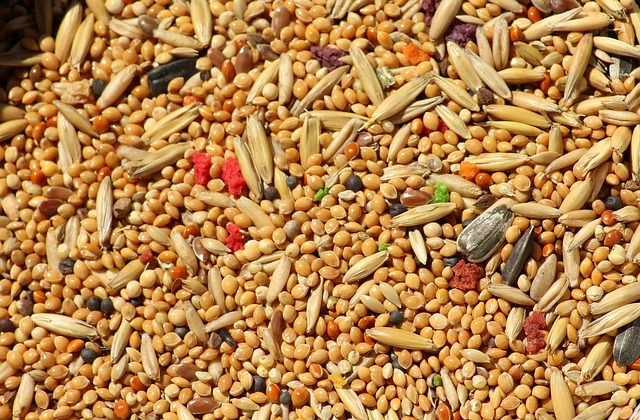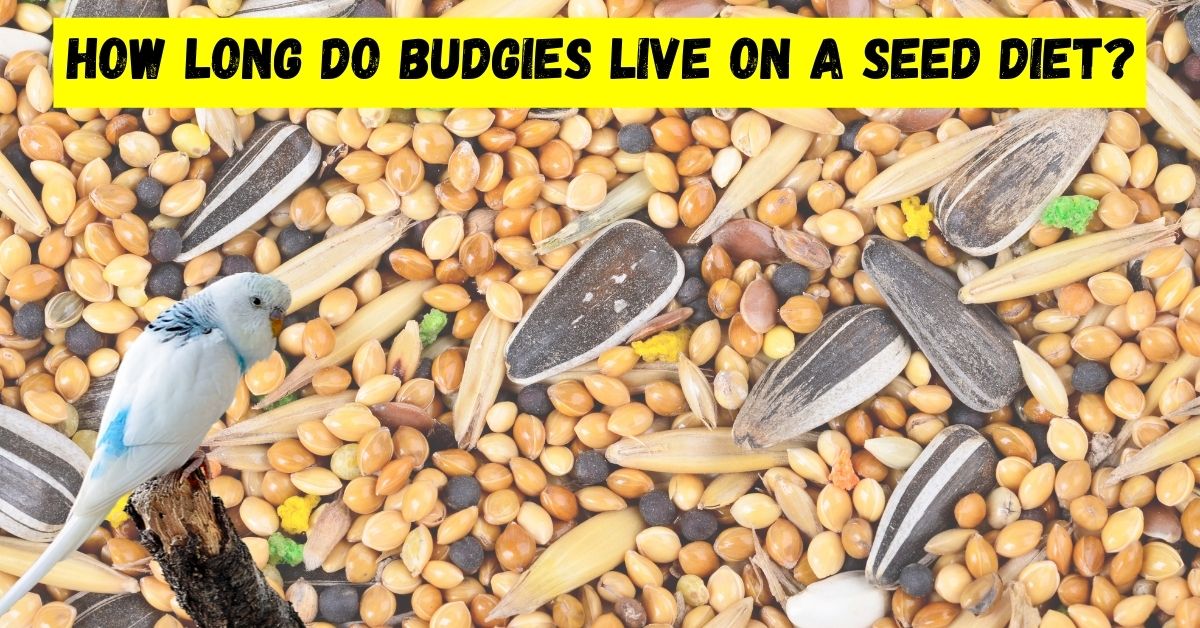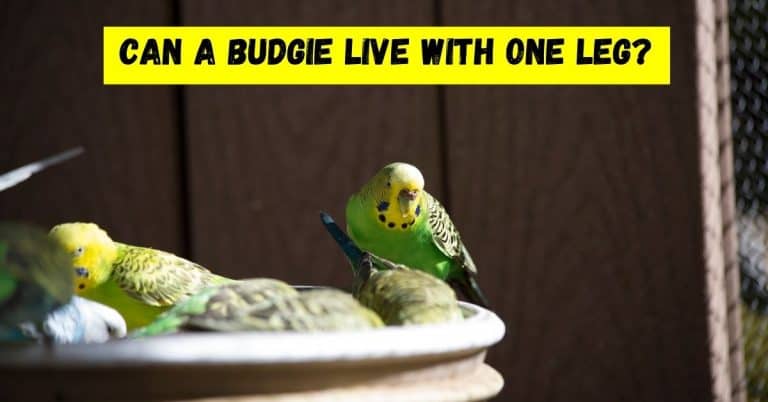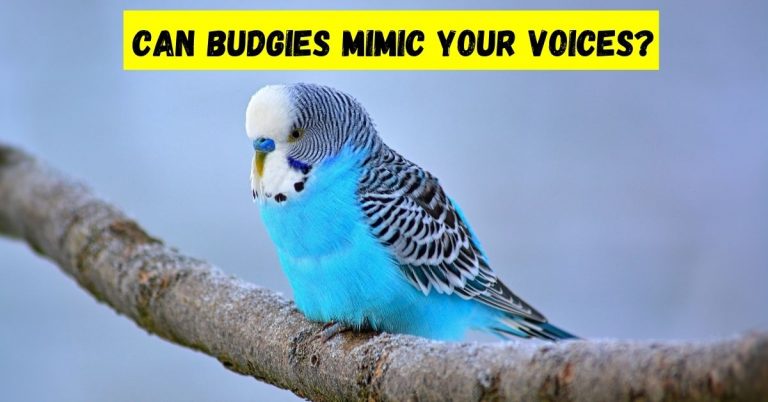How Long Do Budgies Live On A Seed Diet? (Dos & Donts)
I have a lot of budgies at home. If you are raising them for the first time, you may be prescribed by people around that it is okay to restrict them to a complete seed diet.
But, that’s a misconception. Just like humans, budgies need a balanced diet and seeds are a part of their diet. You are risking their lives even without your knowledge.
How long do budgies live on a seed diet? Budgies can live on a seed diet for not more than 2 weeks since an all-seed diet can affect levels of fats, vitamins, and minerals. The lifespan limits to 5-8 years on an all-seed diet.
A balanced diet is important for their overall health and well-being.
In this article, I will explain the ideal diet pattern for budgies and the implications of a seed diet.
Lifespan of budgies on a seed diet
The lifespan of a budgie on a seed diet varies, but it is typically around five to eight years. Budgies that eat a more varied diet tend to live longer than those who eat mostly seeds.
It is important to provide your budgie with fresh fruits and vegetables, as well as a small number of bird pellets, to ensure they get the nutrients they need.
Can budgies survive on just seeds?

The answer to this question is both yes and no. Budgies can survive on a diet of seeds, but it is not the healthiest diet for them. Seeds are low in protein and other essential nutrients, so budgies that only eat seeds can become malnourished.
According to Dr. Sophia Yin, if you supplement their seed diet with other foods, such as fresh fruits and vegetables, then they will be healthy and thrive.
Budgies need a diet that is high in protein and other essential nutrients in order to stay healthy. A diet of seeds alone can leave them malnourished. Surviving on just seeds will potentially lead them to a number of health complications that can shorten their life spans as well.
Also read – Can a budgie live with one leg?
Is an all seed diet bad for budgies?
An all-seed diet is extremely bad for budgies since it can affect feathers, develop obesity, increase fat levels, and also develop new diseases.
Is your bird obese? Here is an article – how to make cockatiel lose weight?
When you provide an all-seed diet, it can leave them short of varieties. As a result, their feeding habits worsen over time. They may get reluctant to eat after a few days. According to Free Range Parrots, this all-seed diet is dangerous to parrots, budgies, and other birds.
A diet with a good variety of fresh vegetables and fruits is much better for their health. It helps them to get the right amounts of different vitamins, minerals, and other nutrients that they need.
Here is a video from Denny The Budgie.
When you are not sure what to feed your bird, consult with a veterinarian or a specialist in avian nutrition. They will be able to provide you with a list of healthy foods to include in your bird’s diet.
It is important to also provide fresh water for your budgie at all times. You can put a small dish of water on the bottom of the cage, or use a bird watering bottle that hangs on the side of the cage.
Change the water every day, and clean the dish or bottle as needed. Debris and bacteria can grow in water that is not changed often enough, which can make your bird sick.
Also read – Should I play budgie sounds for my budgie?
What do budgies eat apart from seed?
A diet for budgies should consist of a variety of fresh vegetables and fruits, in addition to a good quality seed mix. Dark leafy greens are especially important as they are high in nutrients, such as vitamin A, which is essential for healthy eyesight.
Some good choices include kale, collard greens, broccoli, and carrots. Other healthy options include citrus fruits, such as oranges and grapefruits, and berries, such as strawberries and blueberries. It’s best to avoid feeding your budgie processed foods or items that are high in sugar, as these can be unhealthy.
Budgies are also fond of birdie bread, which is a homemade mixture of whole-wheat flour, oatmeal, seeds, and water. This can be fed as a regular part of their diet or used as a training treat. Budgies will also enjoy crunching on fresh cuttlebone or mineral block.
What seeds can budgies eat?
Budgies can eat a variety of both bird and human food seeds. Some good budgie seed choices include:
- Millet
- Canary seed
- Hemp seed
- Sunflower seed
- Safflower seed
- Pumpkin seed
- Chia seed
Some people also offer their budgies bird seed mixes which can include a variety of different seeds. It is important to check the ingredients list on the seed mix before offering it to your bird to make sure there are no harmful ingredients like chocolate or avocado. As with any food, moderation is key when feeding seeds to your budgie. Too many seeds can lead to weight gain and health problems.
So, what are you waiting for? Get to the pet store and stock up on some good budgie seeds for your feathered friend!
There is also an alternative. How about trying seed sprouts for your budgies? Here’s how you can do it.
Frequently asked questions
Can budgies eat sunflower seeds?
Budgies can eat sunflower seeds. Sunflower seeds are a great source of protein, fat, and minerals for budgies, and they can help to keep your bird healthy and happy.
However, it is important to only give your bird a small amount of sunflower seeds at a time, as they can be high in fat.
If you are trying your cockatiel to gain weight, you can give enough seeds. Here is an article – How to make cockatiel gain weight?
At what age do baby budgies eat seed?
Most baby budgies will start to eat seed at around 3 or 4 weeks old. However, some may start a little earlier or later than this. At around 4 weeks, budgies learn to crack seeds and also enjoy crunching them.
It is important to offer your baby budgie food regularly during this time, as they will need the nutrients to grow and develop properly. If you are wanting to start a new diet for your budgie, this is the perfect time to kickstart.
How much seed does a budgie eat per day?
A budgie can eat about 1.5 teaspoons of seeds per day. As they grow, they may need one more teaspoon of it.
According to Bird Supplies, seeds are high in fat and can only be provided rarely.
If you are going to give your budgie a treat, make sure that the seeds are hulled first so they can digest it better.
Budgies, like other birds, have a crop that helps them store food before it goes down to their stomach. This is why they usually eat small bits at a time. If you give them too many seeds, they might end up getting sick.
Should budgies eat pellets or seeds?
Budgies should primarily eat seeds, but they can also eat pellets. Pellets are a good source of protein, vitamins, and minerals, while seeds are a good source of fiber. It is important to provide both types of food to your budgie to ensure that they are getting the nutrients they need.
Some people recommend feeding budgies pellets exclusively, but this can lead to health problems. Budgies need the fiber that seeds provide in order to keep their digestive system healthy. If they only eat pellets, they may become constipated or develop other health problems.
It is best to provide a mix of both pellets and seeds to your budgie. This will ensure that they are getting the nutrients they need, while also getting the fiber they need to stay healthy.
How much millet should a budgie eat?
Budgies should eat about 1/4 teaspoon of millet for every 10 grams of their body weight per day. This means that a 5-gram budgie should eat about 1/8 teaspoon of millet per day, while a 20-gram budgie should eat about 1/2 teaspoon of millet per day.
Young budgies (under 4 months old) should have a slightly lower intake of millet, about 1/8 teaspoon per 10 grams of body weight.
Be sure to only offer your budgie a small amount of millet at a time, as it can easily become overweight if it eats too much. The recommended amount of millet to give your budgie depends on its age and weight.
How many times a day should a budgie eat?
The recommended number of times a day that a budgie should eat is about three to four times. However, it is important to monitor your bird’s eating habits and adjust the number of times accordingly. If your bird isn’t eating as much as usual, increase the number of times per day that you offer food.
Conversely, if your bird is overeating, reduce the number of times you offer food. As with all things bird-related, it is important to keep an eye on your budgie and make sure he or she is staying healthy!
Should budgies have food all the time?
Many people believe that budgies should have food all the time. This is because they need to eat frequently in order to stay healthy. If you don’t give your budgie food all the time, it may become malnourished and sick.
In addition, if you don’t provide your budgie with food, it may start to scavenge for food, which can lead to problems like becoming overweight or developing a harmful addiction to junk food.
Instead of depriving your budgie of food, it is best to provide it with a healthy diet that includes fresh fruits and vegetables, as well as quality bird feed. This will help keep your budgie healthy and happy.
How often should my budgie have millet?
Millet should be given to your budgie every day. It is a great source of nutrition for them and will help keep them healthy and happy. Millet can be found at most pet stores, so it is easy to find and give to your bird.
Make sure to offer other foods as well, such as fruits and vegetables, to provide a balanced diet for your budgie.
Why is my budgie not eating millet?
There could be a few reasons why your budgie is not eating millet.
1. Taste
One possibility is that your bird may simply not like the taste of millet.
If you want to know if budgies/parakeets have taste buds, here is an article – Do parakeets have taste buds?
2. Old food
Another reason could be that there is something wrong with the millet, such as it being old or moldy.
3. Health issues
Finally, your budgie may be experiencing health problems that are preventing it from eating.
If you suspect that your bird is not eating due to health reasons, you should take him to a veterinarian for a check-up.
How to make budgies eat millets?
If your bird does not like the taste of millet, there are a few things you can do to try and get it to eat.
- One option is to mix the millet with a different type of food that your bird likes.
- Another option is to moisten the millet with water or fruit juice before giving it to your bird.
- If you suspect that the millet is old or moldy, you should discard it and replace it with fresh millet. It is important to keep an eye on the millet to make sure that it does not go bad, as moldy food can be harmful to your bird.
Do budgies eat the whole seed?
Budgies break the seed leaving husks behind. They eat the kernel, or embryo, and discard the rest. Some bird species will eat the entire seed, hull, and all.
For example, doves, thrashers, and cardinals will consume whole sunflower seeds. Many small birds such as chickadees, titmice, and nuthatches will also eat the entire seed. However, most birds that consume whole seeds do so because they are ground feeders and the hull is easily crushed.
Why does my budgie throw his seed out?
There could be a few reasons why your budgie throws his seed out.
One possibility is that he is not getting enough to eat. If your budgie is not eating all of his food, he may throw some of it out in order to get attention from you.
Another possibility is that your budgie doesn’t like the seed you are feeding him. If this is the case, try a different type of seed.
There could also be a medical reason why your budgie throws his seed out. If your budgie has a health condition that causes him to vomit, he may throw his food out because he can’t keep it down.
No matter what the reason is, it’s important to pay attention to your budgie when he is throwing his seed out. If he is doing it because he’s not getting enough to eat, you will need to make sure that he is eating enough.
Final Thoughts
Whether you raise budgies or parrots or other birds, an all-seed diet is definitely not recommended considering numerous side effects.
When you begin feeding budgies, remember to give them a balanced diet and plenty of water so they are in their best health conditions.







